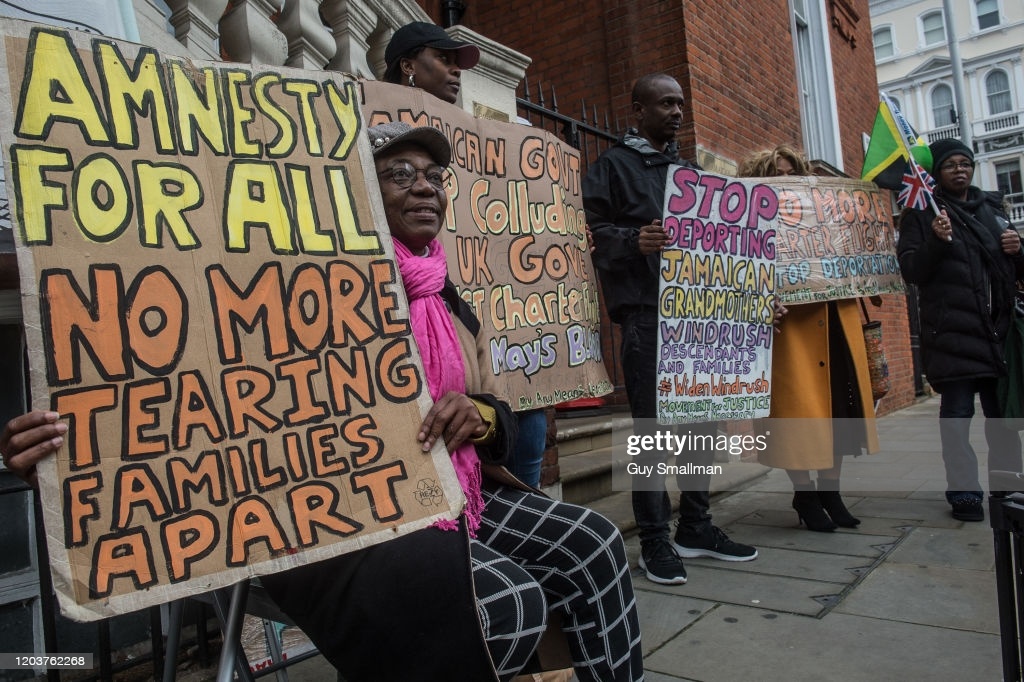News of the Home Office’s plan to deport 50 Black Britons on the 2nd of December was met with outrage and fierce resistance from campaigners and public figures alike.
82 Black public figures including David Olusoga, Naomi Campbell and Bernadine Evaristo wrote to airlines that had previously worked on deportation charter flights urging them not to proceed with the deportations. They warned that some of those due to be deported had suffered ill-treatment citing physical scars or had siblings killed in Jamaica, putting them at risk if removed from the UK.
Detention Action, a charity which works to prevent unjust deportations, stressed the cruelty of the deportations. They found that one of the Black Britons due to be deported attempted suicide in the lead up to the flight, was hospitalised, and then forced straight back into detention to be deported. Detention Action also stressed that the prevalence of COVID-19 in detention centres was capable of constituting a death sentence.
The deportation system itself is unreliable and error-prone. In February, a flight that was due to deport 50 people to Jamaica was disrupted at the last minute when it was acknowledged that four of the deportees were potential victims of trafficking. Another 29 were allowed to stay after a last-minute challenge to the deportation order. One of the men deported on the February flight was the grandson of a woman who arrived on the Empire Windrush and is still seeking to have his deportation order revoked. These examples validate warnings that the December mass deportation risked unlawful removal of people who have the right to remain in the UK.
Under current laws, any foreign nationals who have been convicted of an offence and sentenced to 12 months or more are given deportation orders. For those who have lived the majority of their lives in Britain and have served a 12-month sentence, deportation represents an additional life-long punishment. During the height of the Windrush Scandal, these deportations were halted but Priti Patel has now authorised the resumption of the flights.
Britain’s immigration laws target ethnic minorities, tearing apart families and ignoring the fact that, for those who came to the UK as children, this is the only country they know. Many of those who are deported were sentenced under the now-defunct joint enterprise law or have only one historic offence on their record. Since 2012, Operation Nexus has meant that young Black people who have been unjustly racially profiled are deported without ever being charged or entering the criminal justice system.
Allegations of bullying and racism have been consistently substantiated against the Home Office. The recent resignation of Alexandra Ankrah, the most senior Black civil servant working on the Windrush compensation scheme, calls into question the Home Office’s ability to cease the continuing injustices it has created. Ankrah described the scheme as systemically racist, unfit for purpose and said that some colleagues showed a ‘complete lack of humanity.’ A separate set of complaints about discrimination within a different Home Office team researching the causes of the Windrush scandal led to an earlier internal investigation, illustrating the extent to which racism permeates the Home Office.
In November, a Cabinet Office inquiry into allegations of bullying by Secretary of State Priti Patel found evidence that she broke ministerial code, bullying and harassing civil servants in three separate government departments. Patel has also been accused of ‘deeply insulting and patronising’ behaviour by victims of the Windrush scandal after she labelled those calling for deportation charter flights to be stopped as ‘do-gooding celebrities.’
Amid shocking news that homelessness will become grounds for deportation, it is clear that the Home Office is in vital need of a complete overhaul of practice. Under new immigration rules, rough sleeping will become grounds for refusal or cancellation of permission to be in the UK, effectively criminalising people for not having a home.
I remember, on a flight to Nigeria, witnessing an attempted deportation. A man was brutally manhandled, dragged screaming towards the commercial passenger plane. The cruelty with which the man was treated appalled me, as did the complicity of the commercial airline, undertaking the horrific act for financial gain. In this instance, the objection and horror of the people aboard the flight at the inhumane treatment of the man halted his deportation. Yet, I am sure this action only postponed the deportation process rather than causing it to cease.
What that experience did teach me, however, was the power of collective action. The passengers united in protest against a brutal, dehumanising and unjust deportation system. As in that instant, the action and outrage of the Black British community and those who stand with us against injustice ensured that, out of the 50 Black Britons originally scheduled for the December deportation, only 13 were deported. It is clear to wider British society that these deportations are unjust, thus we will continue uniting to prevent them.
However, it should not be the responsibility of already marginalised groups to ensure that these immoral deportations are prevented. The Home Office must take accountability for the pain and injustice they have perpetrated and commit to treating Black Britons as true British citizens, rather than criminals and foreign elements.
In a country with xenophobia and systemic racism at its very foundations, this is no small feat. There must be a complete overhaul of the way the Home Office functions as well as a reconstruction of British immigration law in order to better understand Britain’s colonial history and prioritise compassion and emotional wellbeing. I know this will not happen under our current government, but I have hope that a fair immigration system can one day be achieved. Until then, we will keep on protesting.
By Ruby Fatimilehin
Featured Image source: The Guardian

